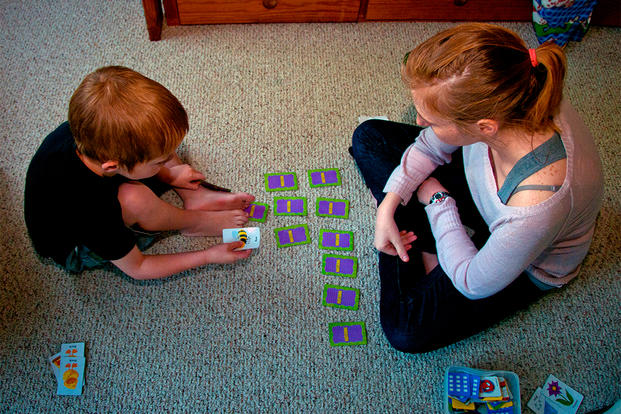A bipartisan group of 40 House lawmakers has asked the Defense Department to delay plans to cut Tricare autism therapy payments by up to 15 percent.
"We are writing to express our continued concerns regarding the Defense Health Agency's (DHA) proposal to reduce Tricare reimbursement rates in 2016 for Applied Behavior Analysis (ABA) to beneficiaries diagnosed with Autism Spectrum Disorder (ASD)," the letter sent March 9 says. "We remain concerned that the new rates could result in a substantive reduction in access to crucial ABA services for the more than 26,000 military children with ASD."
The letter, sent to Defense Secretary Ashton Carter, was signed by 21 Republicans and 19 Democrats. Rep. Chris Smith, R-New Jersey; Rep. Mike Doyle, D-Pennsylvania; Rep. John Larson, D-Connecticut; and Rep. Thomas Rooney, R-Florida, are the letter's original co-signers. Smith and Doyle co-chair the Congressional Autism Caucus, while Larson and Thomas have long worked on Tricare and ABA therapy coverage issues in the House.
ABA therapy is widely considered the most effective treatment for autism. An autism therapy pilot project or "demonstration program" started by the DoD in 2014 combines a trio of Tricare programs that covered ABA therapy across categories of beneficiaries.
One of the stated goals of the demonstration is to expand the availability of therapy. But lawmakers say in the letter that the rate cut will have the opposite effect. They say some providers have already announced plans to leave some service areas in the face of the new payment plan.
"We are concerned that while access grows outside of the military community, Tricare's reduced reimbursement rates for ABA coverage compounded with overall increase in demand will further draw resources away from military families, instead of expanding access," the letter states.
ABA providers are currently paid a fixed rate by Tricare based on education and certification level, regardless of location. But the new plan would set a base hourly rate that is lower than the current payments, and then further adjust it either up or down based on a geographic rate calculation used by Medicare.
Tricare officials told Military.com on March 8 that they are unaware of any providers who have dropped Tricare because of the rate proposal. They said the rates, which were developed based on a duo of studies commissioned by Tricare, are competitive with private insurers. Complaints from providers are likely the results of the rates going unchanged for seven years, said Douglas McBroom, who oversees Tricare's autism program.
"Part of it is that we paid these fixed rates for seven years and that set a bar where they just thought that was rate," McBroom said in an interview with Military.com. "I feel in my heart that the rates are competitive ... Tricare is never the highest and never the lowest."
A similar letter signed by four U.S. senators was sent to the DoD on March 8. The new rates are set to go into effect late this month.
-- Amy Bushatz can be reached at amy.bushatz@military.com.






























